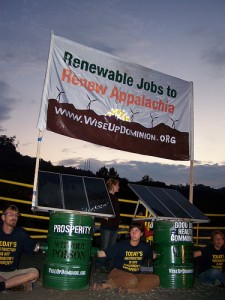Today’s announced decision by the Environmental Protection Agency (EPA) to put a hold on all new mountaintop removal (MTR) coal mining permits is a welcome change to the coal industry’s “rape and pillage” approach to Appalachia. Since the 1970’s, almost 500 Appalachian Mountains have been destroyed, hundreds of miles of streams and rivers buried and numerous communities harmed by mountaintop removal. The environmental and community destruction caused by mountaintop removal needs to be stopped.
Does this decision truly signal the beginning of the end for mountaintop removal?
Here’s what we do know, and what we can do to help speed along MTR’s long overdue demise.
Making Coal Risky Business
The EPA’s decision elevates the risk of doing business with Big Coal, but also illustrates how the coal industry is becoming persona non grata in many political and economic sectors. Appalachian communities and environmentalists have effectively been turning these companies into pariahs so that investors, utilities and politicians stay away from them.
Last December, Bank of America reacted, after being tied too closely to mining companies, with a public policy about mountaintop removal. Their statement included: “Bank of America is particularly concerned about surface mining conducted through mountaintop removal in locations such as central Appalachia. We therefore will phase out financing of companies whose predominant method of extracting coal is through mountaintop removal.” Anti-mining advocates effectively transformed companies like Massey Energy into the “poster children of mountaintop removal.” The bank, already caught in an economic public relations nightmare, distanced their public image far from the practice.
Now the Obama administration is distancing itself from the coal industry as well. We need to continue elevating the risk of doing business with public-image minded corporations as well as politicians.
 The No Coal Movement Strikes Back
The No Coal Movement Strikes Back
The No Coal movement has put pressure for years on the coal industry, utilities, politicians and big banks to move off of coal. Nationally, a diverse coalition of students, Appalachian groups, Indigenous groups, faith-based communities, environmentalists and climate advocates have taken the fight against coal to the political arena, the regulatory commissions, and have even broken the law with non-violent direct action. Actions and campaigns are only increasing as King Coal seems to be down, but not out.
Earlier this month in Washington D.C., over 3,000 people risked arrest to blockade the Capitol Power Plant in the name of “No Coal.” The Washington D.C. action sparked a pre-emptive reaction from House Speaker Nancy Pelosi and Senate Leader Harry Reid calling to remove coal from the plants’ fuel mix (but unfortunately not other fossil fuels like natural gas). A small, but somewhat meaningful acknowledgment of the No Coal movement’s organizing prowess.
An ongoing string of actions have been occurring at Coal River Mountain. The site of a proposed wind farm, Massey Energy has begun mining operations on the mountain. Five acts of civil disobedience have occurred since February and more are expected into the summer.
Last week in Knoxville, TN, 14 anti-coal activists were arrested protesting at the headquarters of the Tennessee valley Authority (TVA). TVA is largest utility (and consumer of coal) in the nation. They are also responsible for the coal ash waste spill that occurred in east Tennessee over last Christmas.
On April 20th in Charlotte, NC another large peaceful action will occur at the headquarters of Duke Energy. Duke is building a new coal fired power in Cliffside, NC that will emit 312 million tons of carbon over 50 years, the rough equivalent of 1 million new cars on the road. A call for civil disobedience has been put out. A broad coalition has emerged to counter Duke’s insistence on building the plant. Groups and individuals from around the country will be joining the action.
This is a fierce vibrant movement creating space for many different voices to be heard. The resistance is only growing.
 Next Steps in the Coal Fight
Next Steps in the Coal Fight
It’s a moral imperative that such a cruel and destructive form of resource extraction come to an end. As we move forward from today’s announcement, some of the next steps should include:
1. Revoke already issued permits. Currently, a number of permits for destruction have already been issued (including Coal River Mountain) that won’t be stopped by the EPA’s announcement today. To date, 500 mountains have already been destroyed by mountaintop removal. We can’t wait for those permits to be allowed to move forward. A good next step would be for the Obama administration to revoke those permits.
2. Move off coal entirely. Really, come on, it might be hard but it’s necessary. Regions of our nation have become national sacrifice zones because of the coal industry. Coal is responsible for 42% of worldwide greenhouse gas emissions from fossil fuels (more than oil or gas). Despite industry’s attempts to fool us with false solutions like “clean coal,” and carbon, capture and storage (CCS), the only path towards a clean and sustainable energy future is to end our dependence on coal.
3. Resuscitate the economy of Appalachia with a new wind and solar economy. The coal industry often cites “high-paying jobs” as reason to keep mountaintop removal around. But making Appalachia the frontline in new green jobs offensive, while phasing out the fossil fuel era, is how we end that pesky “jobs vs. environment” argument used by industry to divide environmentalists from workers.
4. End mountaintop removal. As writer Jeff Biggers says “abolish it, don’t regulate it.” While the EPA is moving towards greater regulation of mountaintop removal, several states and municipalities are trying to outright abolish the practice. North Carolina and Georgia (the two largest state consumers of mountaintop removal coal) have bills on the floors of their legislature to put an end to it. Last week, in Jefferson County, WV the county commission passed a resolution to abolish it. Let’s make that a national ban.
The No Coal movement has pulled King Coal into the open and shown them for what they are. Banks and politicians are moving away from the industry, but power is far from shifted on the issue. The EPA’s halting of these permits is great step towards abolishing mountaintop removal and ending our dependence on coal, but as I said above, it remains to be seen whether this is the beginning of the end.
